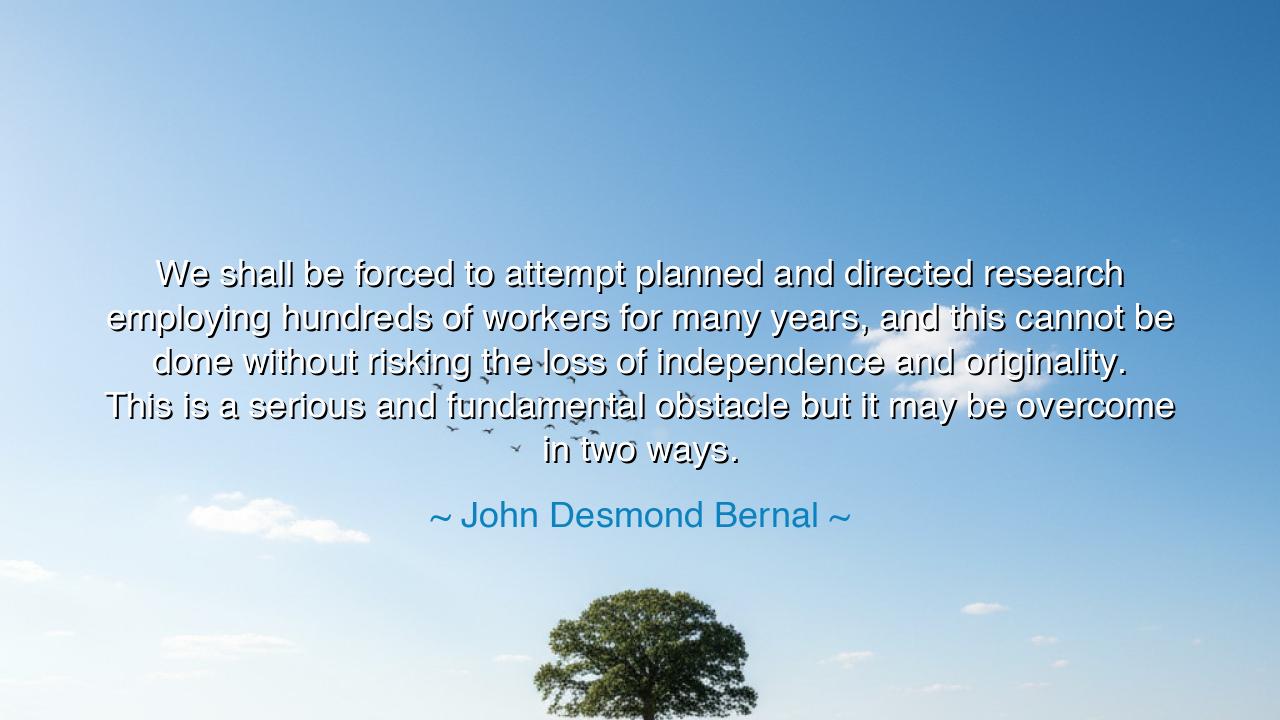
We shall be forced to attempt planned and directed research
We shall be forced to attempt planned and directed research employing hundreds of workers for many years, and this cannot be done without risking the loss of independence and originality. This is a serious and fundamental obstacle but it may be overcome in two ways.






Hear the wise and cautionary words of John Desmond Bernal, the great British scientist and philosopher of knowledge: “We shall be forced to attempt planned and directed research employing hundreds of workers for many years, and this cannot be done without risking the loss of independence and originality. This is a serious and fundamental obstacle but it may be overcome in two ways.” Within this declaration lies not only a vision of science’s future but also a reflection on the eternal struggle between discipline and freedom, between the collective power of cooperation and the solitary spark of genius. Bernal’s words are both a prophecy and a plea — a recognition that the progress of civilization requires vast organization, yet that organization itself threatens the very independence from which innovation is born.
The origin of this quote can be found in Bernal’s reflections on the scientific enterprise during the early and mid-twentieth century. The age of the lone inventor was passing. The world was entering a new era — one where discoveries demanded laboratories, governments, funding, and collaboration on a scale humanity had never known. It was the time of “big science”, where physics, chemistry, and biology began to merge with industry and state policy. Bernal, a physicist and historian of science, foresaw both the glory and the peril of this transformation. He understood that as research grew larger and more institutionalized, the creative flame of the individual thinker could be dimmed beneath the machinery of planning and hierarchy.
In his words, Bernal captures a paradox that reaches far beyond science. For organization, though necessary for progress, can also become the enemy of the spirit. The ancient philosophers spoke of this too. Plato warned that when society prizes efficiency above virtue, the soul grows mechanical; Aristotle taught that greatness springs not from compulsion, but from the freedom to seek truth for its own sake. Bernal’s concern was the same — that in the pursuit of knowledge through vast, coordinated effort, humanity might lose the very originality that made discovery possible. The more science became a collective enterprise, the more its participants risked becoming instruments rather than creators.
Yet Bernal was no cynic. He did not despair of progress, but sought to harmonize it with the creative spirit. He believed that this “fundamental obstacle” — the loss of independence — could indeed be overcome. How? First, through a culture that honors and protects the freedom of the mind, even within institutions. The scientist, though part of a greater structure, must still be allowed to question, to dream, to challenge. Second, by remembering that science, like art, is not only about results but about vision — that even in the most planned endeavor, the essence of discovery lies in the unpredictable leap of imagination. In this way, Bernal saw hope: that human cooperation could coexist with the originality of the individual.
Consider the story of the Manhattan Project, which unfolded shortly after Bernal’s words were written. It was the ultimate example of planned and directed research — thousands of minds working toward one goal, under secrecy and pressure. It achieved the unthinkable: the splitting of the atom and the creation of the atomic bomb. Yet in that triumph lay Bernal’s warning fulfilled. For though the project demonstrated the power of collective research, it also revealed the moral and creative perils of science bound too tightly to state and purpose. The independence of the scientist — the freedom to ask not only “how” but also “why” — was compromised. What had been a quest for understanding became a mechanism of destruction.
Bernal’s insight, therefore, is not confined to the laboratories of his age. It speaks to every generation that seeks progress. In every human endeavor — in politics, in art, in industry — the same tension persists. The more we coordinate, the more we risk conformity; the more we systematize, the more we endanger the soul of innovation. True progress must therefore walk a narrow path: embracing the unity of purpose while preserving the diversity of thought. The wise leader, like the wise scientist, must learn to build structures that do not cage the mind, but elevate it.
So let this be the lesson: in every great undertaking, guard your independence as a sacred flame. Work with others, but never let your mind become another cog in the wheel. Remember that all discoveries — whether of science or of the spirit — begin in a moment of original thought, born in solitude, nurtured by curiosity, and sustained by courage. Cooperation may build empires, but only individuality births genius. Bernal’s words are thus a call to all who create and seek: be part of the world, but never lose yourself within it. For only by uniting the power of many with the vision of the few can humanity truly ascend to the heights of wisdom.






AAdministratorAdministrator
Welcome, honored guests. Please leave a comment, we will respond soon